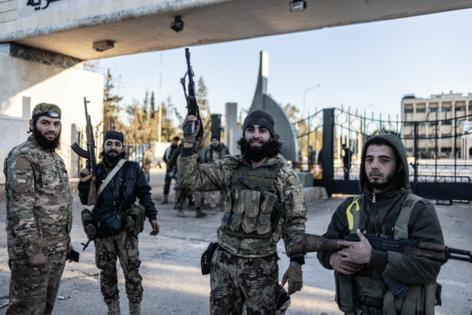Syria flares up with Russia and Iran fighting other conflicts
Published in News & Features
The biggest challenge to Bashar al-Assad’s regime seemingly came out of nowhere, and as Aleppo fell to Turkish-backed rebels in a matter of days, the Syrian president reportedly flew to Moscow.
Russia’s intervention in Syria’s civil war almost a decade ago turned the tide in Assad’s favor, but this time around his two biggest backers are stretched. Vladimir Putin’s invasion of Ukraine is consuming Russian resources while Iran finds itself weakened by Israel’s sustained attacks on Hezbollah, the Tehran-backed militants in neighboring Lebanon.
It’s been four years since the conflict in Syria reached an uneasy stalemate. The country, which borders Israel, Lebanon, Turkey, Iraq and Jordan, had laid relatively dormant as the Middle East convulsed following the Oct. 7, 2023 massacre of Israelis by Hamas.
That changed late last week with reports that Hayat Tahrir al-Sham, a breakaway faction of al-Qaeda, had staged a surprise offensive on Aleppo, Syria’s largest city. They captured it over the weekend and are headed toward another major goal, Hama. In their sights: the capital, Damascus.
The problem for Assad is that neither Russia, which is carrying out air strikes against the rebels, nor Iran are really in a position to come to his rescue, according to Joshua Landis, director of the Center of Middle East Studies at the University of Oklahoma. The rebels based in their last bastion of Idlib perhaps weren’t even expecting to break through, but they are now pushing on.
“The opposition has far exceeded what it set out to do and when it realized that there was little the Syrian military was willing to fight for and began to just melt away, they’ve been on a roll,” Landis said in an interview with Al Jazeera. “They hope to go to Damascus.”
Assad is now in crisis mode and huddling with his old allies. After meeting with an Iranian envoy, the president emphasized “the importance of the support of allies and friends in confronting foreign-backed terrorist attacks.”
Russia joined Iran in expressing “extreme concern” over the militants’ rout of government forces and stressed “strong support for the sovereignty and territorial integrity of the Syrian Arab Republic” after a call on Saturday between their two top diplomats.
The sudden escalation in Syria came after Turkish President Recep Tayyip Erdogan announced plans to create a safe zone along the border with Syria and push away hostile Kurdish forces. With Russia and Iran otherwise preoccupied, the question is whether Erdogan was spotting an opportunity.
Turkey is a key player because not only does it have the biggest military in NATO after the Americans, but because it views its fight against Kurdish separatists as an existential one. The U.S. sees Kurdish groups as critical to defeating and preventing a resurgence of Islamic State in Syria.
It helps that the U.S., which has forces in northeastern Syria in support of Kurdish forces, has its hands tied after Donald Trump won the November presidential election. The U.S. blamed Syria’s reliance on Russia and Iran and its refusal to implement a United Nations Security Council-mandated 2015 peace process for the “conditions now unfolding.”
Turkey has proposed to Washington that its army could take over the fight against Islamic State in Syria if the U.S. pulls out its troops and ceases military support to the Kurds, according to the people familiar with the discussions. The U.S. hasn’t yet responded to the Turkish proposal.
In the meantime, all eyes are on the response from Moscow. Back in 2012, Barack Obama’s administration suggested it would intervene militarily if Assad used chemical weapons on his people. When that line was tested and Obama blinked, Russia entered to prop up Assad and protect Moscow’s interests in Syria on the eastern Mediterranean.
With Russian help, the Syrian army retook Aleppo in 2016 after a long siege. It is now going to need “weeks or even months” to recapture the city, said Elena Suponina, a Middle East expert based in Moscow.
Russia is reaching out to Turkey in a bid to resolve the crisis, she said, with Iran’s influence in Syria weakened by the devastating Israeli military campaign against Hezbollah and Israel’s intensified air strikes on Syrian territory. “Moscow doesn’t see the need now to sharply increase its level of support for Assad,” Suponina said.
Russian Foreign Minister Sergei Lavrov on Saturday held telephone talks with his Turkish counterpart, Hakan Fidan, in which they “agreed on the need to coordinate joint efforts aimed at stabilizing the situation in Syria,” according to the Russian Foreign Ministry.
Israel, too, is worried at the deteriorating situation in its neighbor.
A victory for the rebels could see them arrive at the border, while a recovery for Assad’s army would likely demonstrate an increase in assistance from Iran, according to Major-General Tamir Yadai, chief of Israeli ground forces.
“So, both scenarios are not favorable to us,” he said at the Israel Hayom conference.
______
(With assistance from Firat Kozok and Dan Williams.)
©2024 Bloomberg L.P. Visit bloomberg.com. Distributed by Tribune Content Agency, LLC.







Comments